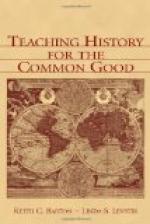He will correlate the past and the present
If there are facts recounted in the lesson that may be clinched in the student’s mind by showing the relation of those facts to present-day conditions or institutions, a few advance questions calculated to bring out this relationship may well be assigned.
It is generally conceded that one chief purpose of history instruction is to enable us to interpret the present and the future in the light of the past, but it all too often happens that current history is forgotten in the recital of facts that are centuries old. Candidates for teachers’ certificates in their examinations in United States history show far less knowledge about the great problems and events of the present day than they do of colonial history. The student in English history in our high schools to-day knows all about the Domesday Book, but almost nothing of the recent history of England. Quite possibly the text has nothing to say about it, and it is equally likely that the class may fail to cover the text and miss the little that is actually given. No opportunity should be missed to indicate the bearing of the past on present-day conditions. Even if the events of the lesson exert no direct influence on affairs to-day, their significance may be brought home to the student by an illustration from current history. The account of the Black Death gives excellent occasion for a brief discussion of modern sanitation and the war on the White Plague. The efforts of Parliament to fix wages can be illustrated by some of the minimum wage laws passed by recent legislatures. John Ball’s teachings suggest a brief discussion of modern socialism, daily becoming more active in its influence. The medieval trade guilds and modern labor unions; the monopolies of Elizabeth’s time and the anti-trust law of to-day; George the Third’s two hundred capital crimes and modern methods of penology; the jealousy of Athens in guarding the privilege of citizenship and the facility with which immigrants at present become American citizens are only a few illustrations, indicating the ease with which the past and the present may be correlated.
He will be required to memorize a limited amount of matter verbatim
In assigning a lesson it is sometimes desirable to require certain matter to be learned verbatim. In American history the Preamble to the Constitution, the principles of government contained in the Declaration of Independence, the essential doctrine in the Virginia and Kentucky Resolutions, certain clauses of the Constitution, and extracts from other historical documents may well be required to be memorized accurately. It is scarcely to be supposed that the student can improve on the clarity and definiteness of the English in such documents. He is expected to understand the principles which they assert. He may well be required to train his memory to accuracy by learning certain assignments verbatim. If memory work received a little more attention in our high schools to-day, we should be less likely to hear the statement of a political creed neutralized by the omission of an important word. We should be less likely to see the classic words of Lincoln mangled beyond recognition by messy misquotation.




